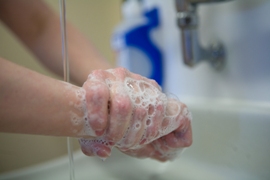Clostridium difficile – useful information
 Please find below some information about clostridium difficile and the steps you can take to prevent infection.
Please find below some information about clostridium difficile and the steps you can take to prevent infection.
-
What is clostridium difficile?
Clostridium difficile is sometimes known as ‘C difficile’ or ‘C diff’. It is a bacterium (germ) which is present as one of the ‘normal’ bacteria in the gut of up to 3 per cent of healthy adults and 66 per cent of infants.
However, clostridium difficile rarely causes problems in children or healthy adults as it is kept in check by the normal bacteria already in the intestine.
-
How can you catch it?
Clostridium difficile can cause illness when certain antibiotics used to treat other health conditions disturb the balance of ‘normal’ bacteria in the gut. When this happens clostridium difficile bacteria can multiply and cause symptoms such as diarrhoea.
It is also possible for the infection to spread from person to person as those suffering with diarrhoea shed spores in their faeces. The spores are able to survive for long periods of time and can contaminate the surrounding environment, such as toilets, bedclothes, skin and clothing. The spores can be picked up by hand-to-mouth contact and remain in the gut. Some people may then go on to develop the clostridium difficile symptoms.
-
What are the symptoms?
- Mild-to-severe diarrhoea.
- Fever.
- Loss of appetite.
- Nausea.
- Abdominal pains or tenderness.
- Life-threatening inflammation of the intestines (in rare cases)
-
How is it diagnosed?
As it is difficult to diagnose a clostridium difficile infection on the basis of the symptoms alone, the infection is normally diagnosed by a laboratory test from a sample of the patient’s faeces.
-
Who is at risk?
- Individuals over 65 years old (80 per cent of cases occur in this group).
- Patients who have a weak immune system.
- Patients who have had repeated enemas and/or stomach surgery.
- Patients being treated with antibiotics.
-
How can it be treated?
Clostridium difficile is treated with specific antibiotics and most patients make a full recovery. There is a risk that some patients may experience further episodes of clostridium difficile. This is known as a relapse and happens in approximately 20-30 per cent of patients. However, elderly patients with other medical conditions are at increased risk of more severe illness.
-
What you can do to prevent the spread of infection
- Make sure you wash your hands with soap and water before and following any contact with infected persons.
- If you are a patient remember to wash your hands frequently.
- Alcohol hand rub does not kill off the clostridium difficile germ, but it will do no harm to use it after hand washing.
- If you are visiting someone in hospital do not eat or drink in the same room as the infected person.
- If you are taking or have recently been taking antibiotics or fall into one of the at-risk groups mentioned above speak to a healthcare professional before visiting someone in hospital.
-
What precautions do we take as an ambulance service?
As an ambulance service we remain fully committed to ensuring that all our patients receive care in a clean and safe environment.
We take infection prevention and control seriously and have implemented policies and procedures to minimize the risk of infections.
All our staff have been trained in hand hygiene and issued with alcohol hand rub to ensure they can always clean their hands in between patients. They also ensure that the ambulance is cleaned appropriately after each patient.
- More about preventing infections

Follow us on social media: